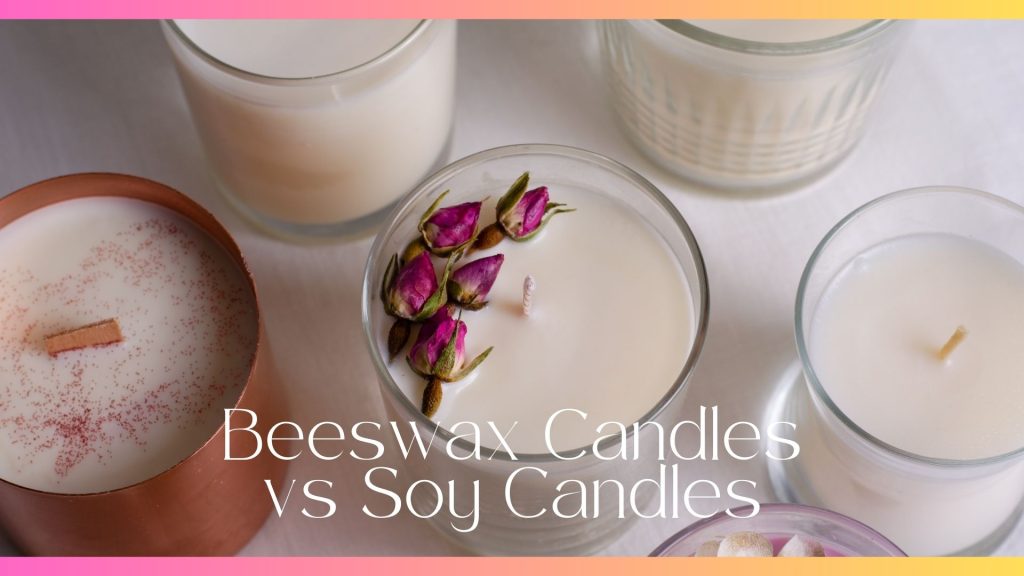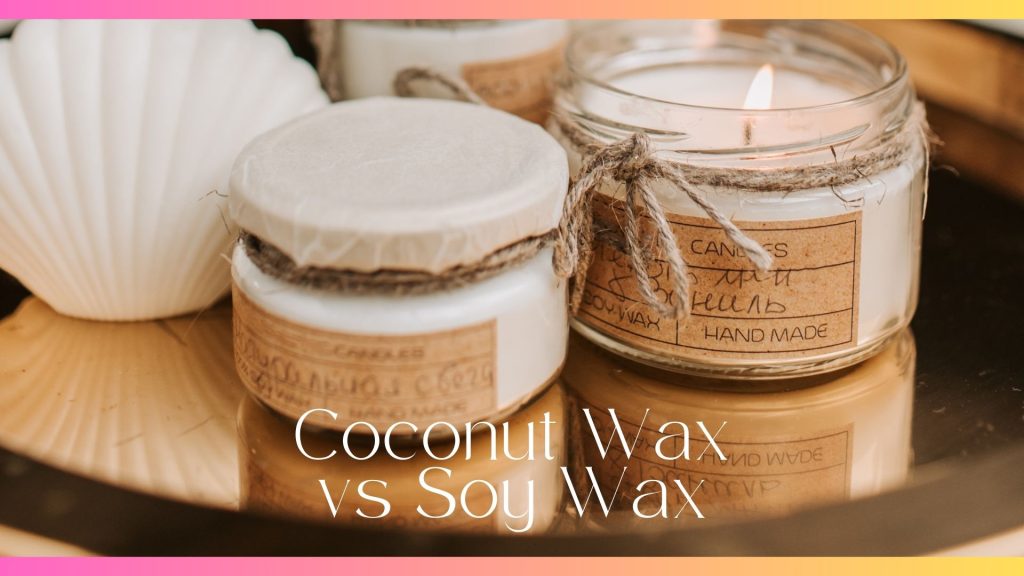Want to compare using fragrance oils vs essential oils in candles? You’ll have to know the differences to choose the right ones for your candles.
When selecting scents for your candle waxes, you can choose between fragrance oils and essential oils. While both offer delightful aromas, they differ in composition, source, and characteristics.
In this article, I’ll discuss the distinctions between fragrance oils and essential oils in candle making, consider the pros and cons for both, as well as their impact on overall candle performance (if any).
Disclaimer: This post may contain affiliate links. This means I may earn a small commission (at no cost to you) if you sign up for a program or make a purchase using my link!
Related Posts:
- Best Essential Oils for Candles – How to Choose Yours
- How To Use Scented Candles In 8 EASY Steps
- How Much Fragrance Oil To Add To Your Candles?
What are Fragrance Oils?
Fragrance oils are synthetic or aromatic compounds made to replicate the scents of natural plants, fruits, spices, etc. They are crafted by perfumers and fragrance chemists using a combination of synthetic aroma chemicals and natural isolates.
Due to it’s synthetic properties, fragrance oils come in a wide-range of scents, from familiar florals and fruits to exotic and more unique blends. They are used in candle making to create scented candles due to it consistency, longevity, and versatility.
Pros & Cons of Fragrance Oils
There are pros and cons to using fragrance oils. Here are some of them that you should know!
Advantages:
- Diverse Selection: Fragrance oils come in an extensive range of scents, allowing candle makers to choose from a wide variety of options to suit different preferences and occasions.
- Long-lasting Fragrance: Fragrance oils typically offer strong, long-lasting scents that remain potent throughout the life of the candle and for burning multiple times.
- Stability: Fragrance oils are stable and reliable, maintaining their scent profile and performance over time, making them ideal for mass production and commercial candle making.
- Cost-effectiveness: Fragrance oils are often more affordable than essential oils, making them a cost-effective option for producing scented candles in large quantities.
Disadvantages:
- Synthetic Composition: Fragrance oils are synthetic or semi-synthetic compounds, which may contain artificial ingredients and allergens that some individuals prefer to avoid.
- Limited Therapeutic Benefits: Fragrance oils lack the therapeutic properties of essential oils, as they are primarily designed for fragrance rather than for aromatherapy.
- Environmental Concerns: The production of fragrance oils may involve the use of petrochemicals and other synthetic substances that can have environmental implications.
Read: How much fragrance oil to add to soy wax?
Fragrance Oils for Candle Making
Fragrance oils are a popular choice for candle making alongside essential oils, thanks to their versatility, affordability, and strong scent throw. They can mix well with various types of candle wax, including soy, paraffin, and beeswax.
Candle makers also prefer fragrance oils as they are available in an extensive range of scents. This allows for the creation of unique products that may not be widely sold in the market.
Another thing to consider when creating scented candles would be whether the scents remain potent after adding to a wax mix. Fragrance oils are designed to be stable at high temperatures, making it easier for candle lovers to enjoy their scented candles for a longer time.
Regardless if you’re using fragrance oils or essential oils, you’ll need to follow recommended usage rates to achieve the best scent performance without compromising the candle’s burn quality.
5 Best Fragrance Oils for Candles
The best fragrance oils for candles are those that provide a strong and lasting scent, are stable at high temperatures, and blend well with the chosen wax. This may differ for every product so you’ll need to test them out to find the best one for your candle.
Popular choices of fragrance oils for candles include:
- Vanilla: A classic, comforting scent that blends well with other fragrances.
- Lavender: Known for its calming properties, it’s a favorite for relaxation candles.
- Citrus: Scents like lemon, orange, and grapefruit provide a fresh, invigorating aroma.
- Cinnamon and Spice: Ideal for creating warm, cozy scents, especially popular in the fall and winter.
- Floral Scents: Such as rose, jasmine, and gardenia, perfect for romantic or spring-themed candles.
What are Essential Oils?
Compared to fragrance oils, essential oils are natural, volatile compounds extracted from aromatic plants through methods such as steam distillation, cold pressing, or solvent extraction. They carry the natural characteristics of the plant, including its unique fragrance and therapeutic properties.
This is to say that essential oils are scented oils that are naturally extracted, instead of being artificially created from a mix of chemicals, like fragrance oils. Candle makers prefer them due to their natural origins, purity as well as versatility.
Just like fragrance oils, there is a long list of scents you can go for when choosing essential oils, and each possess unique aroma profiles and holistic benefits.
Pros & Cons of Essential Oils
Essential oils also have a set of pros and cons that you will need to consider before adding them to your candles!
Advantages:
- Natural Origin: Essential oils are derived from plants, making them a natural and sustainable choice for fragrance in candles. Compared to fragrance oils, they do not contain synthetic additives or artificial ingredients which appeals to eco-conscious consumers.
- Therapeutic Benefits: Essential oils offer holistic benefits for the mind and body. Depending on which oil you’re going for, they may be used for relaxation, upliftment, or purification through the burning of candles.
- Custom Blending: Essential oils can be blended together to create custom fragrance combinations, allowing candle makers to tailor scents to their preferences and intentions.
- Environmental Friendliness: Essential oils are biodegradable and environmentally friendly, minimizing the ecological footprint of candle production and disposal.
Disadvantages:
- Variability: The scent and potency of essential oils may vary based on plant species, growing conditions, and extraction methods, leading to inconsistencies in fragrance quality.
- Fragrance Persistence: Essential oils may evaporate more quickly than fragrance oils when exposed to heat, resulting in shorter-lasting scents in candles.
- Cost: Essential oils are often more expensive than fragrance oils due to their natural origin and extraction process, making them a higher-cost option for commercial candle-making.
Essential Oils for Candle Making
Despite the higher price point, essential oils are preferred for candle making due to their natural therapeutic benefits that are not present in synthetic fragrance oils. Eco-conscious consumers and sellers would also be more inclined to choose essential oils for their candles.
Essential oils like lavender, eucalyptus, peppermint, and lemon are commonly used in candles for their pleasant aromas and health benefits, such as promoting relaxation, improving mood, and providing a sense of well-being.
However, they tend to have a lower scent throw, making it even more important to use essential oils with a high flash point to ensure they remain effective when the candle is burning.
Best Essential Oils for Candles
When choosing essential oils for your candle making process, it’s crucial to consider their flash points and scent potency. Oils with high flash points (above 150°F) are preferable as they are more stable and less likely to evaporate or burn off quickly during the candle-making process.
Popular essential oils for candle making include:
- Lavender: Known for its calming properties, perfect for relaxation candles.
- Eucalyptus: Offers a refreshing, invigorating scent, ideal for stress relief.
- Peppermint: Provides a cooling, uplifting aroma, great for enhancing focus and energy.
- Citrus Oils (Lemon, Orange, Grapefruit): These oils give a fresh, clean scent, perfect for energizing and uplifting the mood.
Fragrance Oil vs Essential Oil in Diffuser
When used in diffusers, fragrance oils and essential oils offer different benefits. Fragrance oils provide a wide variety of scents and tend to have a stronger, longer-lasting aroma, making them ideal for continuous scent diffusion.
Essential oils, on the other hand, are natural and often used for their therapeutic benefits, such as stress relief and mood enhancement. I personally use lavender essential oils with my diffuser at home to make it easier for me to get a good night’s sleep.
While essential oils may not have as strong a scent throw as fragrance oils, they are preferred by those looking for natural and potentially health-promoting aromas. The choice between the two depends on whether the priority is scent variety and longevity, or natural benefits and purity.
Fragrance Oil vs Essential Oil in Body Butter
Want to add scented oils in body butter? You’ll have to consider the desired properties and effects.
Fragrance oils offer a broader range of scents and are typically less expensive, making them ideal for those primarily interested in a pleasant fragrance. However, they may not offer any additional skin benefits.
If you’re creating a natural product with health benefits, essential oils should be used instead. Explore options with therapeutic properties such as anti-inflammatory, antiseptic, and calming effects, which can enhance the overall benefits of the body butter.
It’s fair to point out that essential oils are more costly and may have a shorter shelf life. As a seller, you’ll have to take note of these details to provide suggestions on usage to customers i.e. “best used before”.
Natural Fragrance Oils for Candles
Confused between fragrance oils vs essential oils in candles? You can opt for natural fragrance oils instead.
Natural fragrance oils are a hybrid mix of oil that is derived from natural sources and are designed to provide a cleaner, eco-friendly alternative to synthetic fragrance oils. They are usually made by combining essential oils with other natural ingredients that helps enhance their scent profile and stability.
With the enhancement, natural fragrance oils can be used for candle-making as they are stronger in scent and lasts longer (with natural aromatherapy benefits). They can still be considered eco-friendly!
Bottom Line
Both fragrance oils and essential oils offer unique advantages and considerations in candle making. Whether you’re a candle-maker or a candle user, it’s important to know the differences.
When choosing between the two, decide on whether you prioritize scent longevity, cost, therapeutic benefits, or use of natural products. The decision isn’t always easy so it’s fair to try out different products before deciding on what works for your candles.
Whichever you go with, make sure to use high-quality, candle-specific scented oils and follow recommended usage rates to ensure safety and optimal candle performance.
Test and compare!
Frequently Asked Questions (FAQs)
It depends on your goals. Essential oils are natural and offer therapeutic benefits, making them ideal for aromatherapy. However, they can be more expensive, have a lower scent throw, and may not blend well with all waxes. Fragrance oils, on the other hand, are synthetic or a blend of natural and synthetic components. They are more affordable, offer a stronger and more consistent scent throw, and are available in a wider variety of scents. For stronger, longer-lasting scents, fragrance oils are often preferred.
Essential oils can be challenging to use in candles because they have lower flash points, meaning they can evaporate or burn off quickly when heated. This can result in a weaker scent throw compared to fragrance oils. Additionally, essential oils can be more expensive and may not blend well with all types of wax. Some essential oils can also cause discoloration in the wax or may not remain stable during the candle-making process, leading to inconsistent performance.
Fragrance oils formulated specifically for candles are generally safe to burn. These oils are designed to withstand the high temperatures of burning candles and release their scents without producing harmful byproducts. It is important to use high-quality, candle-specific fragrance oils and follow recommended usage rates to ensure safety and optimal performance. Always check that the fragrance oils comply with safety standards and regulations to avoid any potential health risks.
Fragrance oils typically last longer than essential oils in candles. This is because fragrance oils are formulated to withstand the heat of the candle flame and have a higher scent throw. Essential oils, being natural, can degrade more quickly and evaporate at lower temperatures, leading to a shorter-lasting scent. Fragrance oils are also more stable and can provide a consistent aroma throughout the candle’s burn life, while essential oils might fade faster.
Adding too much fragrance oil to a candle can lead to several issues. The excess oil can cause the candle to burn improperly, resulting in a weaker flame, excessive soot, or even extinguishing the flame. It can also lead to oil seepage, where the oil doesn’t fully mix with the wax, creating a greasy surface. Overloading the candle with fragrance oil can also affect the wax’s structure, making it softer and potentially causing tunneling or uneven burning.
Yes, you can mix fragrance oils with essential oils to create unique scents in candles. This combination allows you to enjoy the benefits of both: the robust scent throw and stability of fragrance oils, along with the natural, therapeutic properties of essential oils. When blending, ensure you follow safe usage rates to maintain the candle’s performance and safety. Experimenting with different ratios can help you achieve the desired scent profile while maintaining a balanced and effective candle.


